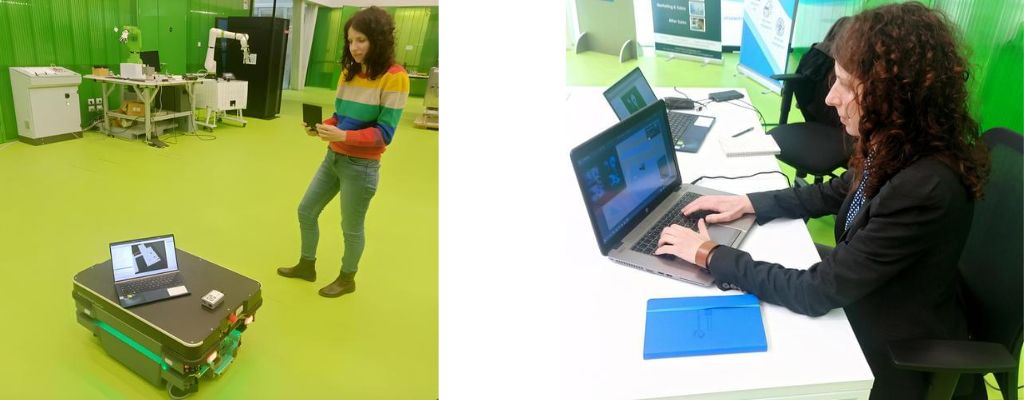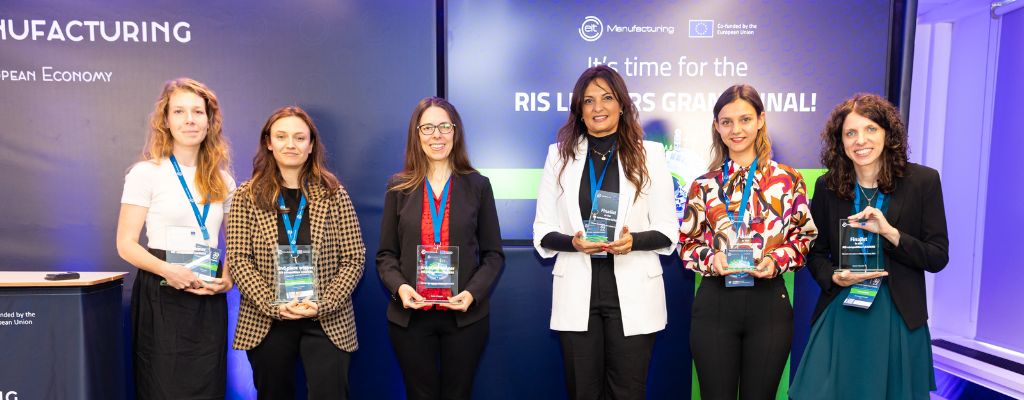Interview with Paola Bonesu
Paola Bonesu excels in analytics. The entrepreneur from Italy was one of the finalists of the 2022 LEADERS competition and has taken a winding road into manufacturing, combining cognitive frameworks with semantics. In this interview she tells us about her background and the attraction of the manufacturing industry.
Would you describe your career path as unconventional?
Indeed, it somehow is unconventional. I have always been told that I have an ‘analytical’ personality. Although I have always had a passion for technology and digitalisation, I went for a degree in political science, worked on election campaigns for a while and then started working as a data analyst, initially for an energy company.

Paola Bonesu in conversation with Megi Mejdrechova who won first prize in the LEADERS 2022 competition.
How did you come to co-found your business?
When I worked for a start-up that dealt with parliamentary data retrieval and analysis, I got to know people, skills and artificial intelligence technologies that intrigued me. I saw that some of the techniques we applied to politics and lobbying could be used to offer valuable services to other business divisions.
This is why my business partner Gabriele Lami and I co-founded ELIF LAB, a company specialising in the creation of data science and artificial intelligence solutions, and in the design and development of algorithms dedicated to solving complex problems in different industries.
What was the initial focus of ELIF LAB?
At first, our technologies at ELIF LAB found natural application in the service sector, especially text analysis and behavioural analysis. In recent years, we have acquired strong skills in video and image analysis in addition to that. This information can be leveraged in predictive maintenance and as one of the tools we use for more rigorous analysis and automation of manufacturing processes.
At the same time, we have also become interested in the topic of robots working within dynamic environments, such as plants. These different aspects form the basis for JinZone.
Please tell us about JinZone.
JinZone is a cognitive framework of artificial intelligence and semantics applied to robotics. This framework allows robots to understand and interact with their surroundings – they can navigate, map, reach objects and avoid others accurately and flexibly. At the same time, JinZone ensures that operators can access the reasoning behind the choices the machine makes.

Paola Bonosu in her lab environment.
What makes JinZone stand out as a solution?
We can introduce these technologies in a streamlined way in terms of time, energy consumption and approach to automation, even in dynamic environments such as industrial ones. We neither need to use landmarks nor rely on huge datasets nor resort to costly and time-consuming training.
AI has come under scrutiny for some time. How do you perceive this?
A debate has arisen, yes. There is much talk about huge models based on neural networks, which are, however, by their very nature opaque and data- as well as energy-hungry. We create an artificial intelligence that is transparent, adaptive, capable of communicating in a natural manner with humans, and able, in a certain sense, to resemble a human mind in its functioning.
How does this AI learn?
Like a child, it needs to learn from examples and experience, but also from external rules such as the teachings provided by human beings. For this reason, we took topographical and dynamical models of the mind established in psychology and philosophy as a first reference when we started developing JinZone.
What will the future of AI look like?
At a social and legislative level, we are seeing a push towards more transparent and explainable AI. Not least, this is to ensure more effective and reasonable human-machine collaboration as well as democratising these technologies. The aim is to make them completely accessible and manageable even for small companies. Beyond its application to manufacturing, I think it is useful to rethink how we want to develop artificial intelligence in the near future.
What is the most exciting aspect of your current position?
To be leading a company, albeit a small one, that is at the forefront of such an innovative and promising field as artificial intelligence, is certainly very exciting and there’s almost no time to relax! We are now discussing a number of agreements with major hardware manufacturers in order to be able to provide customers with a complete robotisation package within factories already in the first months of 2023.
Tell us about what you are planning next.
We are looking at new applications for our AI framework, which can act as an orchestrator of different robot activities, but also manage the interaction between different robots and between robots and drones, in areas that in addition to manufacturing include agriculture, logistics and hospitality services. The interaction between swarms of robots and between robots and humans, as a “political scientist lent to artificial intelligence”, is of great interest to me.
You have taken part in the LEADERS competition which is specifically dedicated to women innovators in manufacturing. Can you share some advice with women who want to work in manufacturing?
Definitely: remain curious. Do not be intimidated by topics that seem far removed from your field of study. Follow your passions! Complex processes require different skills, knowledge and sensitivities to find non-trivial solutions and create real innovation.
Paola Bonesu, Co-Founder ELIF LAB
Why did you specifically consider manufacturing as a field of activity?
Well, I came to manufacturing gradually – production industries look at automation with more interest than others, considering it relieves the operator of all the dull, dirty and dangerous tasks. It’s a very challenging context: an area where you have to be very practical and efficient. That’s what fascinates us the most, seeing things work and making the difference in everyday practice.

All finalists of the LEADERS 2022 competition.
What effect did the LEADERS competition have?
A few days after the event in Brussels, I was contacted by a leading Italian multinational in the industrial automation and manufacturing sector. Meeting them, it turned out that I had been noticed due to the fortunate circumstance that they had read one of the articles on the EIT Manufacturing website about the LEADERS initiative and found my story and project interesting. Now we are considering some projects together to apply artificial intelligence within their plants and on their machines.
Obviously, this is a very important opportunity for us and a contact that came about quite unexpectedly. Probably it would never have come about without LEADERS!
Apply now for LEADERS 2023!
Are you a woman innovator? And do you have a solution that addresses manufacturing-related challenges? Then take a look at the LEADERS 2023 Call. It’s open to applications now – you can submit your application until 18 July 2023.
All information about the RIS LEADERS Call 2023
About the LEADERS competition
In November 2022 the “LEADERS – Women Innovators in Manufacturing” prize was awarded by EIT Manufacturing as part of the Regional Innovation Scheme (RIS) for the second time. Thereby, EIT Manufacturing wants to draw attention to women innovators and women in the manufacturing industry, as women are still underrepresented in this sector.
For the final pitch a jury selected six candidates, whose projects play a leading role in developing solutions addressing manufacturing-related challenges with strong financial, environmental, or societal impact.
What is the EIT Regional Innovation Scheme (RIS)?
More information about the EIT Regional Innovation Scheme (RIS)
Get to know another finalist of LEADERS 2022!
Sofija Daceva – a genuine entrepreneur

